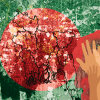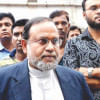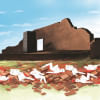Remembering the barbarities of Operation Searchlight

On the fateful night of March 25, 1971, the Pakistani army officially launched its campaign of genocide in erstwhile East Pakistan, by unleashing death squads that mercilessly killed 7,000 unarmed, innocent Bengalis in one single night. In the Pakistani national elections of December 1970, the Awami League had received the majority of votes and won an overwhelming victory across Bengali territory. On February 22, 1971, the military generals in West Pakistan, who hitherto enjoyed the throne, took a decision to crush the Awami League and its supporters. It was recognised from the outset that a genocidal campaign would be necessary to eradicate the threat of Bengalis demanding basic democratic and human rights: "Kill three million of them," said President Yahya Khan at a February conference, "and the rest will eat out of our hands."
The prime targets of Operation Searchlight were the Dhaka University teachers and students, the lifeblood of the resistance movement, who were exterminated in their hundreds. The Pakistani army sought out those especially likely to join the resistance—young boys. In the next morning, bodies of young men would be found in fields, floating down rivers, or near army camps.
Anthony Mascarenhas, a British journalist based in Pakistan, who was the first to break the news of the Bengali genocide in international media, reported a Pakistani army major telling him: "This is a war between the pure and the impure... The people here may have Muslim names and call themselves Muslims. But they are Hindu at heart. We are now sorting them out... Those who are left will be real Muslims. We will even teach them Urdu."
Meherunnesa Chowdhury, who was a Senior House Tutor of Rokeya Hall, described how female student halls were raided by army men, who, before brush-firing hundreds of students to death in their own dorms, would look for girls they thought were "pretty" and would capture and drag them to their army trucks, never to be seen again. Male students were lined outside their dorms and shot execution-style in batches, while others were made to dig mass graves and bury their newly deceased friends. After their job was done, they, too, were shot to death and buried on top of their friends.
Other mass graves were dug by the army where people, dead or alive, were hastily buried and later bulldozed. Anwar Pasha, in his docu-novel, Rifle, Roti, Aurat, describes the sight of the fingers of some just-buried people sticking out from under the ground like baby plants, which fought for life, but could not quite make it. The Pakistani soldiers knew all the "noble" arts of warfare. First, they set fire to the houses of slum dwellers, and then when they came out, half-burnt, running on the streets in panic, the army mowed them down with bullets "for violating the curfew order". Survivors described how human corpses lay as far as the eye could see, charred and roasted on the streets, the sidewalks and the portico of homes. Pasha describes the body of a son and a father on the roof of a building, the sight of which was particularly unsettling. The father had tried to protect his son, dearer than his own life, by spreading his own body over his, like a veritable shield. Alas, despite the father's best efforts, the machine gun's bullets had pierced through both of them as they lay in that position.
Children described how they, while hiding underneath the bed to escape detection from the army, had to witness their parents being shot to death, as their lifeless bodies crashed against the bedroom floor, creating a pool of blood which soon seeped into their own hands and faces. Their heart signalled them to scream their lungs out, but their brains instructed them to keep silent, unless they, too, wanted to be shot and killed. A father described how his 14-day-old baby daughter was thrown outside the window by the army, in front of his very eyes. When he screamed in protest, he too was shot and lost consciousness ("Operation Searchlight", Boishakhi TV documentary).
Zakaria Masud described how his father, Professor Moniruzzaman, head of the Department of Statistics at the University of Dhaka, and elder brother were similarly killed. The army banged against their door at the dead of night, but since no response came from the other side, they broke it open with heavy boots and searched for the professor. Upon finding the professor, they dragged him and his son by the stairs and after reaching the driveway, they asked him to sit down on the floor. He refused. So they shot his left calf, and blood began to spill seamlessly. The army asked him to sit again, but the professor remained steadfast in his denial and so they finally shot him in the forehead and he fell to the floor, never to rise again.
Professor Meghna Guhathakurta describes how her father, Jyotirmoy Guhathakurta, an English teacher at Dhaka University, was picked up from their house by the army, and how her mother had innocently handed her husband an extra pair of clothes, should he need to spend the night outside. Moments later, they heard rounds of gunfire upon which they stormed out of their door to find the freshly shot bodies of their beloved neighbours, Professor Moniruzzaman and his son, gasping for life.
On the same night, the offices of leading national newspapers like the Daily Ittefaq, the Daily Sangbad and the People were set on fire for reporting the truth and supporting the Bengali movement, killing a large number of top journalists and media personnel, who were burnt to death inside these offices. Soldiers razed the Kali Mandir, a Hindu temple, to the ground and blew up the Central Shaheed Minar in a similar fashion. On the streets, common citizens were murdered at random. Rickshaw pullers were shot to death in their sleep as they lay on their three-wheelers.
On the eve of this genocidal campaign, then-president Yahya Khan left Dhaka for Karachi, but Zulfiqar Ali Bhutto, then president of the Pakistan People's Party, casually observed the operation from the balcony of his luxurious presidential suite at the Hotel Intercontinental, Dhaka. He saw Dhaka burning in front of his very eyes, heard the helpless cries of innocent civilians, the crackle of burning material, the roar of tanks, the boom of guns and the rattle of machine guns. Yet the very next day, Bhutto, on the eve of his departure, highly appreciated the action of the army and commented: "Thanks to God that Pakistan could have been saved."
Sadly, in spite of the overwhelming evidence, footage of the killings, the mass graves, innumerable eyewitness accounts and the factual coverage by foreign journalists during 1971, the Bangladeshi genocide has still not been recognised as such by the United Nations. Even more repulsively, the Pakistani government, far from issuing an official apology, continues to deny that such atrocities even occurred, going as far as showing solidarity for the war criminals of 1971 and shielding them from prosecution. It is deeply regrettable that while some Pakistani citizens and academics have acknowledged and condemned this genocide, the Pakistani government has shamelessly chosen to remain in denial. This is precisely why the truth of the Black Night of March 25, 1971 must be brought to light, so everyone, both in and outside Pakistan, finally gets to know about the world's most forgotten genocide and us, Bangladeshis, finally get to see Pakistan's own version of Nuremberg Trials take place.
Taqbir Huda is a Researcher Specialist at Bangladesh Legal Aid and Services Trust (BLAST) and can be reached at [email protected].
Sources for the piece include "The Rape of Bangladesh" by Anthony Mascarenhas, Rifle, Roti, Aurat by Anwar Pasha, Massacre: The Tragedy at Bangla Desh by Robert Payne, and a Boishakhi TV Documentary titled "Operation Searchlight".










Comments